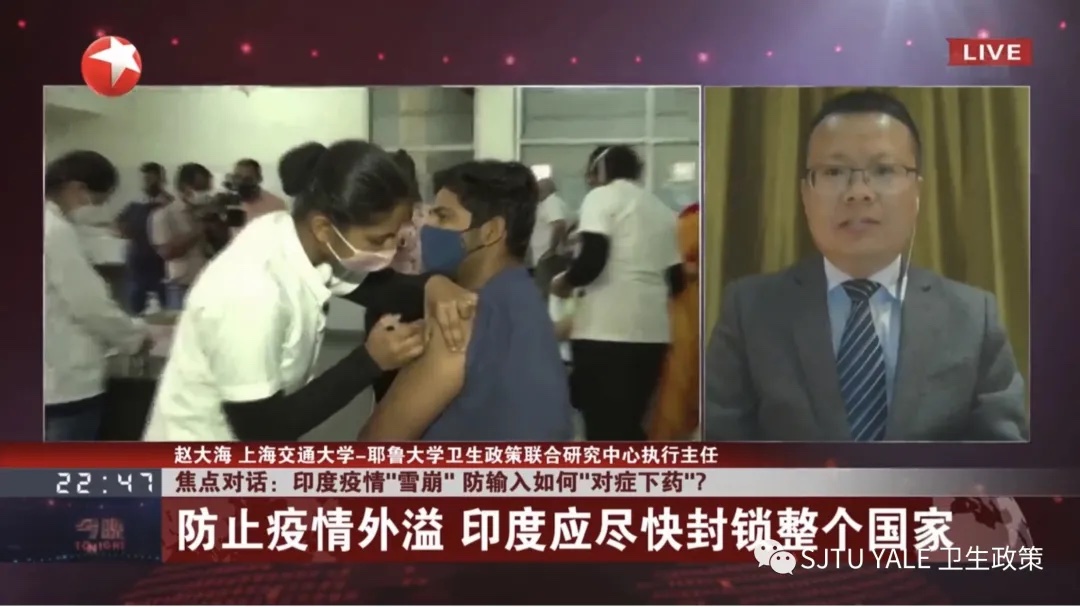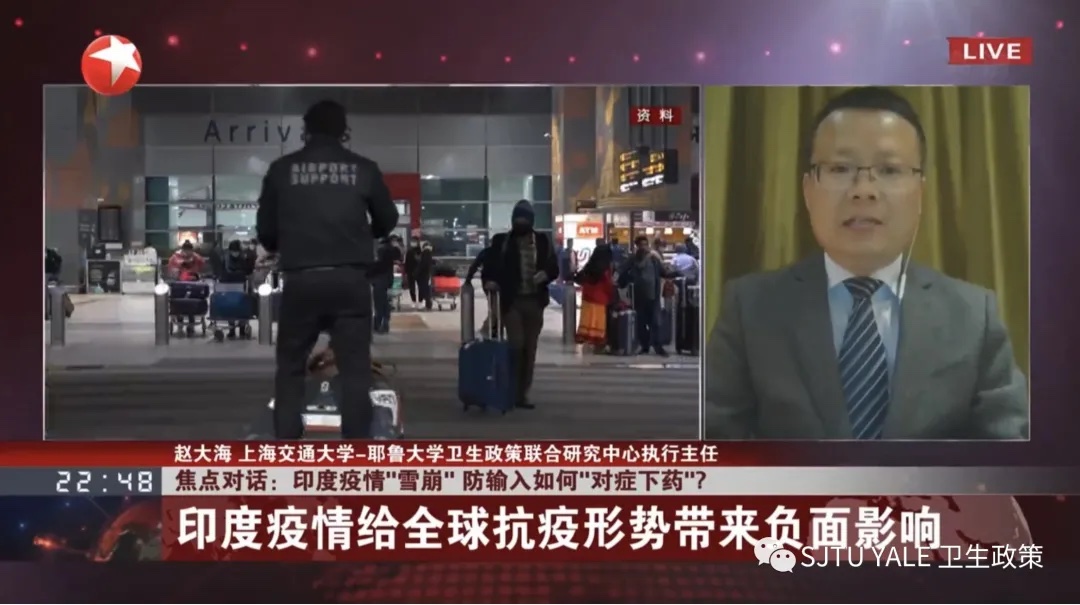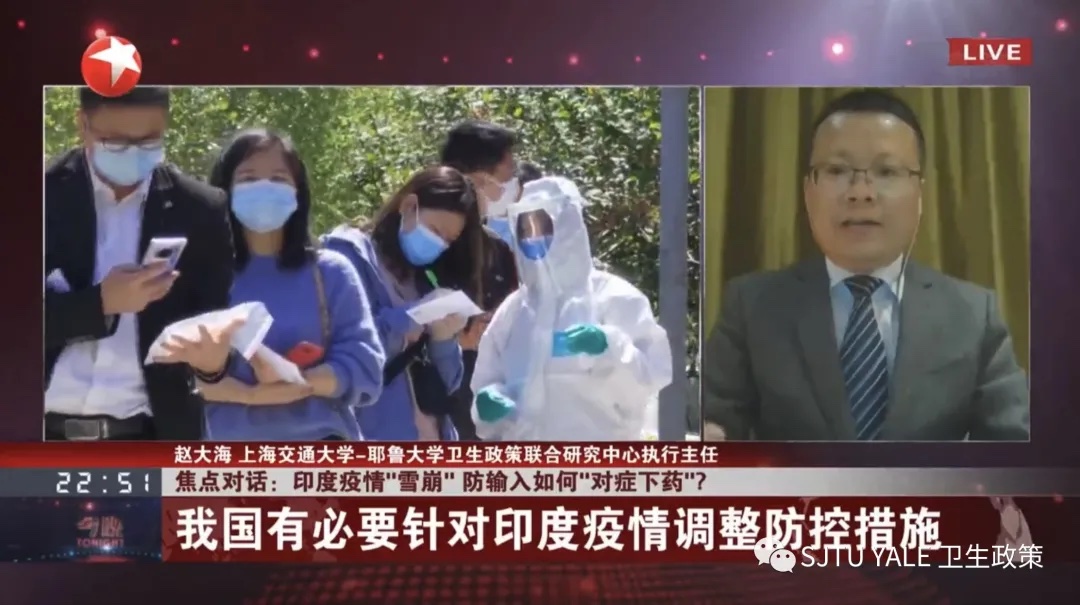上海交大赵大海教授接受东方卫视专访:印度需调整新冠疫情防控策略

上海交通大学国际与公共事务学院教授、博士生导师,上海交通大学-耶鲁大学卫生政策联合研究中心执行主任赵大海,自新冠肺炎疫情暴发以来,对于新冠疫情暴发、防控以及卫生政策第34次接受上海电视台专访,也是第89次接受央视、上视专访。2021年5月3日,赵大海在东方卫视《今晚》节目,就印度新冠疫情及对世界和中国的影响等相关话题进行了评论。现将有关访谈内容摘录如下。
主持人:印度此轮疫情自3月中下旬开始发酵,此后疫情就呈爆发式增长。为什么印度疫情难以控制?
赵大海:我认为有两个主要原因。第一,印度自4月1日开始的大壶节,这一超大规模人群聚集,官方统计数据是1亿5千万人,使得疫情在超大规模群体里大暴发,由于暴露人口过大,疫情就很难控制。第二,印度政府一直没有出台严格的防控措施,使得疫情防控的战机一再错失。

主持人:美国传染病学专家福奇近日表示,印度应该立刻"封锁整个国家",您怎么看?
赵大海:印度必须要采取封锁整个国家的办法。在如此大规模新冠疫情暴发的前提下,如果再采取一些隔靴搔痒的干预措施已不可能防控住此次大规模疫情暴发。除此之外,加速新冠疫苗接种的进程,积极、主动争取国际社会的医疗物资的援助,都是印度政府应采取的措施。
主持人:如果印度疫情持续恶化下去,会给全球的抗疫形势带来怎样影响?
赵大海:印度疫情持续恶化,对全球的抗疫形势无疑是非常负面的影响。此外,对印度周边国家的疫情防控的压力已开始显现出来。最近不少印度周边国家的新冠确诊病例已有了较大的增长。另外,考虑到印度原本是新冠肺炎疫苗实施计划的疫苗重要供应国家,印度疫情持续恶化,对大量发展中国家的新冠疫苗供应也带来较大的负面影响。

主持人:随着印度疫情剧烈上升,包括美国、澳大利亚等多个国家都出台了针对印度入境者的禁令,您觉得,我们国家有没有必要针对这一疫情状况,在常态化的防控机制上做出针对性调整?
赵大海:我认为我国有必要针对印度的疫情,在常态化的防控机制上做一些调整。比如,原先我们对于境外航班有熔断机制;有必要在此基础上进一步强化。甚至,出台暂时对印度入境者的禁令也是备选的措施之一。
主持人:目前,印度本轮疫情中的双重变异病毒,已经在多个国家发现,我们现在接种的疫苗,对于防范双重变异病毒能起到作用吗?如果不能,该如何防范?
赵大海:首先,各国还没有任何证据显示,新冠疫苗没有办法阻止双重变异病毒。到目前为止,还没有关于接种新冠疫苗的群体当中,有多少或多大比例感染了双重变异病毒的统计或报道。因此,我们目前还没有办法确切地回答这个问题;对于这个问题,有待于未来相关数据的统计和披露。与此同时,我们非常肯定地讲,新冠疫苗一定是有效的。当然,无论接种的疫苗能否防范住双重变异病毒,采取常规的新冠疫情防控措施都是必需的。
供稿:国务学院
日期:2021年5月5日
Dahai ZHAO’s Exclusive Interview with ShanghaiTV: The ongoing challenges give a much needed boost to the public health strategies in India
Dahai Zhao, a doctoral supervisor at the School of International and Public Affairs of Shanghai Jiao Tong University and Executive Director of Shanghai Jiao Tong University-Yale University Joint Research Center for Health Policy, has been interviewed by ShanghaiTV for the 34st time (the 89st time by CGTN / ShanghaiTV) since the COVID-19 pandemic. On May 3, 2021, Zhao commented on COVID-19 in India and its implications for the world and China on “Tonight” of Shanghai TV.
Anchor: The outbreak in India began to ferment in mid-to-late March and has since exploded. Why is it so hard to control the epidemic in India?
ZHAO: I think there are two main reasons. First, since the Big Pot Festival in India on April 1st, this super large-scale crowd gathering, the official statistics is 150 million people, making the epidemic outbreak in the super large-scale group. Because the exposed population is too large, the epidemic is difficult to control. Second, the Indian government has not issued strict prevention and control measures, making the opportunity for the prevention and control of the epidemic repeatedly missed.
Anchor: Fauci, an American expert in infectious diseases, recently stated that India should immediately “lockdown the entire country". What do you think?
ZHAO: India must lockdown the whole country. Under the situation of such a large outbreak, it is impossible to prevent and control this large-scale outbreak by adopting some ineffective intervention measures. In addition, accelerating the process of COVID-19 vaccination and actively seeking the assistance of medical materials from the international community are the measures that the Indian government should take.
Anchor: If the outbreak continues to worsen in India, what impact will it have on the global response?
ZHAO: The continued deterioration of the epidemic in India will undoubtedly have a very negative impact on the global containment. In addition, the strain on India's neighbours is beginning to show up. Recently, a number of countries around India have seen large increases in the number of newly confirmed cases of coronavirus. In addition, given that India is an important vaccine supplier for the COVID-19 vaccine implementation programme, the continued deterioration of the outbreak in India will have a significant negative impact on COVID-19 vaccine supply in a large number of developing countries.
Anchor: As the epidemic in India has risen sharply, many countries, including the US and Australia, have imposed bans on entry to India. Do you think it is necessary for our country to adjust its normal prevention and control mechanism in light of this epidemic situation?
ZHAO: I think it is necessary for China to make some adjustments in the normal prevention and control mechanism in light of the epidemic in India. For example, we used to have the circuit breaker mechanism for foreign flights. It is necessary to further strengthen on this basis. A temporary ban on Indian entry is even on the table.
Anchor: At present, the double mutation of the virus in India has been found in many countries. Will the vaccine we are using now be effective in preventing the double mutation? If not, how can we prevent it?
ZHAO: First, countries do not yet have any evidence that the COVID-19 vaccine does not prevent the double mutation. Till now, there have been no statistics or reports on how many or what percentage of the population vaccinated with COVID-19 have been infected with the dual variant. So we don't have a way to answer that question for sure at the moment; For this issue, the statistics and disclosure of relevant data in the future are awaited. At the same time, we are very confident that the COVID-19 vaccine will be effective. Of course, routine COVID-19 prevention and control measures will be necessary regardless of whether the vaccine is designed to protect against the double-mutant virus.
Contributor: SIPA, SJTU
Date: May 5, 2021

